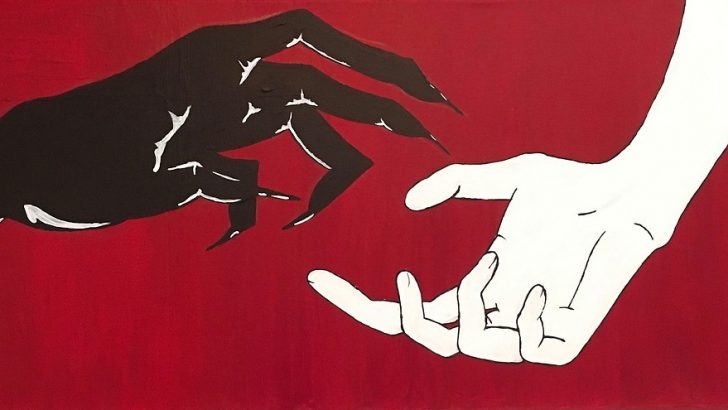Good and evil are things we actively choose, writes David Quinn
Fr Pat Collins wants us to confront a very uncomfortable thought: evil is real. In the West, we often like to pretend that evil does not exist, or if it does, can be reduced to psychological categories.
In his new book, Freedom from Evil Spirits, Fr Collins wants us to consider evil in all its force and not to shy away from thinking about it.
And Fr Collins is not asking us to think of evil ‘only’ as the bad things we choose to do, but evil in the sense of something that can be an actual demonic force. We are even slower to think about evil in this way, but it is exactly what Fr Collins wants us to do because he believes such evil exists, that he has seen it and that it is more common than we think, so it is no good pretending it does not exist.
We are still willing to believe that certain things really are evil and cannot be explained in any other way. The Holocaust falls into this category for most people, and so does child sex abuse. These exceptions aside, however, we do our best to minimise the existence of evil and to try and explain it away. We are very reluctant to think that people might actually freely choose to do evil things.
Attack
A horrible and fascinating case came before the courts recently. It involved a woman named Laura Kenna who attacked and stabbed in the neck another woman, Fionnuala Burke, while Ms Burke was on her way to work.
Ms Kenna was sitting on a wall in Drumcondra, not far from the offices of the Archbishop of Dublin, when she jumped off to assault and attempt to kill her victim.
During the trial, divergent testimony was heard about her mental health at that moment.
Ms Kenna and her legal team said she was suffering from delusions about death, vampires and cannibalism.
As reported in the Irish Independent, Dr Stephen Monks of the Central Mental Hospital (CMH) told the jury that Ms Kenna was suffering from schizoaffective disorder, a chronic mental illness related to schizophrenia.
But Prof. Harry Kennedy, also of the CMH, testified that she was not delusional at the time, but carried out the attack in anger and out of a “sense of entitlement”; she told gardaí she’d needed money.
Prof. Kennedy said her attack would not come under the definition of insanity. He said that she possessed “callous” and “unemotional” personality traits and had the ability to “fabricate for her own interests”.
In the end, the jury found Ms Kenna guilty of attempted murder and she is awaiting sentencing.
The jury in this case had to decide whether Ms Kenna had consciously and freely chosen to do an evil thing or whether she was mentally ill at the time of the attack.
When my friend and work colleague Tom O’Gorman was brutally killed in his home in Castleknock five years ago, it was subsequently decided that his killer was mentally ill at the time of the attack and was not freely choosing to carry out a very terrible deed.
When Alan Hawe killed his wife Clodagh and children, and then himself, in 2016, he was initially buried with them because it was judged at the time that he could not have really chosen to do such an awful thing. He must have been mentally ill, and in a sense he was a victim as well.
But the family of those he killed felt otherwise, and so in time his body was exhumed and buried elsewhere. We recently saw Clodagh Hawe’s sister and mother being interviewed on RTÉ.
In the above three cases, and there are many more, we can see the way people wrestled with the thought that evil had been freely chosen each time an act of great violence had taken place.
But if people rarely choose to do evil, then the flipside of that coin could be that they also rarely choose to do real good, as in genuine, un-self-interested, self-sacrificial good of the truly heroic kind. It is naïve to think we are free to do good and not to think we are also free to do evil.
Also, we have to consider what ‘good’ and ‘evil’ actually are. Are they things that have a real existence, like say, you and me, or are they merely concepts we have invented? If you’re an atheist, it is hard to avoid the conclusion that they are simply fancy words we give to the things we like and the things we dislike. A blank, meaningless universe that comes from nothing and is going nowhere cannot produce real, existential good or evil.
But Christians do believe in Good and Evil as real categories. We believe we can do things that are good in themselves, even holy. And we can do things that are evil in themselves, even unholy things. We can choose the path of sanctity, or we can choose to follow a path of real spiritual evil and immerse ourselves in that, consciously wishing to be unholy. We choose the darkness over the light.
Ultimately, this is what it means to have free will, to have moral agency. We can choose good and we can choose evil, and often we are fully morally responsible for what we do. I think this what Fr Pat Collins is trying to remind us of.


 David Quinn
David Quinn